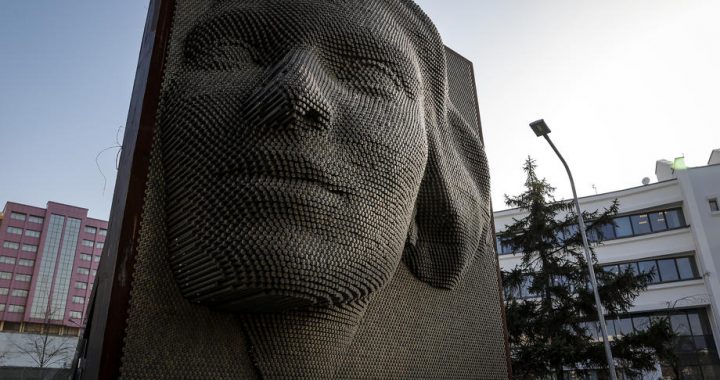

 The ‘Heroines’ memorial to Kosovo Albanian wartime rape survivors in Pristina. Photo: EPA-EFE/VALDRIN XHEMAJ.
The ‘Heroines’ memorial to Kosovo Albanian wartime rape survivors in Pristina. Photo: EPA-EFE/VALDRIN XHEMAJ.
A recent study on Kosovar women exposed to violence in the war showed that family therapy is beneficial for children born as a result of Post Traumatic Stress Disorder, PTSD.
On Thursday, the Kosova Rehabilitation Centre for Torture Victims, KRCT presented the data of the second phase of a study of the intergenerational trauma passed by mothers exposed to violence during the war in Kosovo in 1999-2000 and their children, and looking at whether family therapy can reverse the negative changes caused by this trauma.
Women exposed to torture and violence during the war were also part of the conference named, “Can family therapy reverse epigenetic changes that may be caused by the effects of maternal PTSD and intergenerational trauma?”
The first phase of this study was done in 2019, and proved that children born to traumatized women with PTSD during pregnancy had higher levels of cortisol and showed epigenetic changes on the DNA surface.
On the basis of these findings and recommendations, in the second phase of the study, KRCT started to apply family therapy aimed at treating the transmission of trauma from one generation to another.
The study took the form of a randomized control trial of a family intervention, using Score 15, SDQ – a globally recognized instrument for assessing the mental health status of children and young people – and physical measurements.
Sixty-two mothers and 62 children were included in the study – randomly, 30 families were assigned to the experimental group and 32 to the control group.
Mothers and children undertook evaluations [Score 15, SDQ and physical measurements] in three time intervals, as well as provided blood samples that were used to measure cortisol and methylation of DNA in the entire epigenome (Illumina EPIC array).
Each group attended 10 sessions of family therapy over a period of three to five months, adapted from the United Kingdom Association for Family Therapy and Systemic Practice.
According to the data, in the second phase of the study, mothers had significantly lower cortisol levels after the first phase of the study, although this occurred regardless of whether they were in the experimental or the control group. By contrast, children in the experimental group showed significantly reduced levels of cortisol, but not the children in the control group.
Children in the family intervention group, compared to the control group, showed >1 per cent differential methylation at 4,593 genome-wide CpG sites (at p<0.01), with the largest difference being methylation, of 23 per cent.
The analysis showed the involvement of a number of pathways in cellular processes, metabolism, the nervous system and the processing of environmental information.
When focused only on children born to mothers with PTSD during pregnancy, the study identified two CpG sites and one differentially methylated region that were found to be dysregulated in the previous study.
It was also important to consider the effect of family intervention on endocrine signaling pathways in children born to mothers with PTSD.
Shyhrete Sulejmani, a survivor of sexual violence from the war in 1999, emphasized the challenges faced by mothers who are survivors of sexual violence.
“Every day I ask myself, ‘Am I a good mother?’ The first feeling is devastating and I know many others have that feeling every day. We did not choose the past, but we have the opportunity to choose the present and the future for the sake of the truth and our children,” she stated.
Speaking about the importance of family therapy and the preliminary findings of the study, Line Hjort, from the University of Copenhagen, stated that “epigenetic changes are potentially reversible targets in the process of breaking the cycle of trauma through family therapy”.
The UK ambassador to Kosovo, Nicholas Abbott, emphasized the importance of the study for Kosovo, Britain and the whole world.
“Such unique studies aimed at preventing violence in conflict and preventing the transmission of trauma between generations, not only make the United Kingdom embassy proud, as a supporter of this study, but can also serve survivors of sexual violence in conflict around the world, respectively in Ukraine,” Abbott declared.
This research was carried out in collaboration with the Dignity Institute, Copenhagen University Hospital and Monash University in Australia, and aims to improve the mental health of mothers and their children, respectively interrupting the cycle of trauma between generations. The study was supported by the embassy of the United Kingdom in Kosovo.
16 February 2023 - 17:08

Kosovo’s most turbulent decade returned to the screen as Youth Initi...

The OSCE Mission in Kosovo has condemned sexist and degrading remarks ...

Retired US general Wesley Clark told the Hague court that the KLA was ...

In Kosovo’s capital, Prishtina, dozens of women gathered this Octobe...